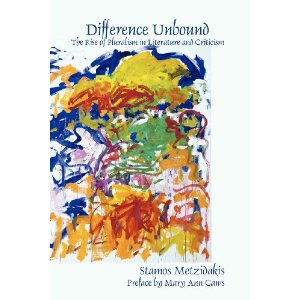
Stamos Metzidakis, Difference Unbound: The Rise of Pluralism in Literature and Criticism
Amsterdam/ New York : Rodopi, coll. "Faux-Titre 94", 2013.
EAN 9789042036260.
276p.
Prix : 29EUR
Présentation de l'éditeur :
This is the first book to examine the precise relationship between pluralism and the production of Western literature and criticism from the eighteenth century to the present. It underscores the historical rather than exclusively epistemological reasons behind what is here called “the rise of literary pluralism.” This rise entails, on the one hand, the modern day phenomenon of an ever-increasing number of readings of both canonical and contemporary works of verbal art; and, on the other, our ever-growing body of literature written with an eye towards different types of characters, situations, forms and styles. Reviewing a wide range of authors and thinkers—from German, French and English Romantics to Anglo-American and European poststructuralist theorists—it shows how and why the current literary emphasis on difference derives from an unquestioned allegiance to the notion of cultural pluralism. While never denying the value of the latter, it seeks instead to analyze the oftentimes unquestioned implications of this historically-situated belief within the specific realm of literary studies.
Table of Contents
Mary Ann Caws: Preface
Stamos Metzidakis: Author’s Note on the Second Edition
Introduction
The “Problem” of Literary Pluralism
Changing Approaches: From Texts to Readers (and back)
Recent Approaches to Critical Pluralism
The Prose Poem’s Deconstruction of Literariness
Modern Literary Quests for Originality
The Modern Promotion of Different Forms
Breton’s Theory and Practice of Originality
Critical Progress
Progress and Modern Literature
Towards a “Fin de siècle” Criticism
Two Modern Types of Progress
Trans-historical Reasons for Critical Progress
Conclusion: Re-viewing Pluralism and Literature
Bibliography
Index of Names Cited
Index of Concepts
Stamos Metzidakis is Professor of French and Comparative Literature at Washington University in Saint Louis. He is the author of two other books, Repetition and Semiotics: Interpreting Prose Poems (1986) and Understanding French Poetry: Essays for a New Millennium (1994, 2nd edition 2001), which he co-authored and edited. In addition, he has edited special issues of the widely read journal L’ Esprit créateur on André Breton and prose poetry, and published over seventy other book chapters, articles and reviews on a wide range of topics. Currently he is finishing two new book manuscripts, Recollecting French America: A Personal Chronology and Des lignes et des lettres: essais néo-formalistes in French.
Revue de presse
“Metzidakis has written an erudite, ambitious, and intentionally provocative work addressing the ways in which we respond to a plurality of readings of both literary and critical texts, and offering what he terms a ‘three-fold polemic against literary criticism’.”
-Rosemary Lloyd, The French Review
“The strength of the book lies in Metzidakis’ approach(es). He combines, juxtaposes and synthesizes the history of ideas, theory of literature, and the practical criticism of texts. He does all three, and all three well. I see at work a fine, subtle, comprehensive mind, a philosophical mind. Metzidakis treats authors and books in a number of languages (French, German, English, also Italian; he knows literature and criticism from 1750 to the present. This is one of a relatively small number of books on critical and theoretical questions that takes ideas seriously yet is also couched in clear, comprehensible English.”
-William Calin, South Atlantic Review
“Metzidakis … reveals many of the ambiguities, half-truths and uneasy compromises that lie at the heart of critical endeavor today. These pages are both enjoyable to read, and, at the same time, disturbing in their implications … He is always careful to point out that he is not making moral judgments on the phenomena that he examines. He merely points out their inherent dangers, and particularly those attached to the contemporary love of the new and original.”
-David J. Bond, French Forum
